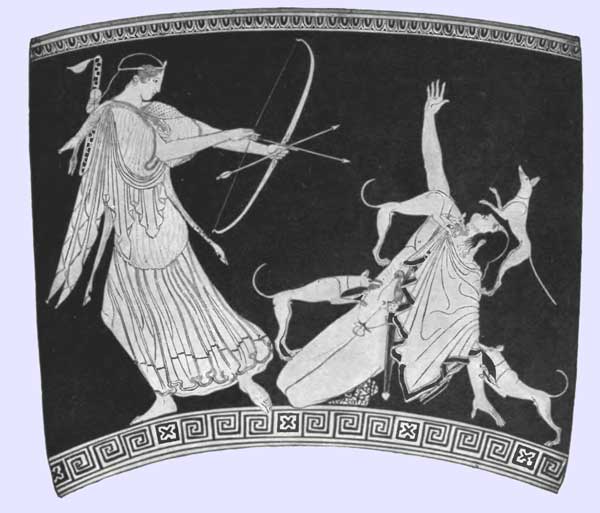
Actaeon: Wrong place at the wrong time
Gods and goddesses like to punish mortals. Sometimes, as in the case of Tantalus, these punishments, though cruel, are arguably just. Tantalus cooked a child and tried to serve his meat to the gods. The Olympians couldn't be expected to tolerate such a grotesque breach of dinner etiquette. So, Tantalus remains in Tartarus, parched with burning thirst and tormented by ravenous hunger. At other times, such as in the case of Arachne, the punishments are unjust. Athena transformed Arachne into a spider simply because the girl proved herself to be a weaver whose skills were comparable to those of the goddess. The punishment was more petty resentment than justifiable reaction to a moral outrage. Today we learn the sad story of the young hunter Actaeon, whose divine punishment proved immensely painful and ultimately fatal. You may decide if these consequences were just. A grandson of Cadmus*, Actaeon was a young hunter who roamed forests each day in the company of his two hunting dogs. One afternoon, while his hounds were seeking quarry elsewhere, the hapless hunter came upon a delectation of nymphs.* As all mortals knew to avoid ethereal beings, Actaeon started to leave when he saw the goddess Artemis bathing. The sight of the moon goddess unapparelled transfixed Actaeon. He neither shielded his eyes nor did he turn away. Instead, he stared. The nymphs hastily encircled Artemis and clothed her. Enraged at having a mortal "intrude on a sacred mystery," Artemis resolved to prevent Actaeon from ever describing her body to others. She promptly deprived him of speech and then transformed him into a stag. The terrified Actaeon swiftly fled away deeper into the forest only to soon encounter his hunting dogs. On seeing a stag approach, the hounds leapt to the attack. Though now swifter than his dogs, Actaeon stumbled and was soon captured. Not knowing the stag's true identity, the hounds tore Actaeon to shreds and devoured him. Their hunger satiated, the dogs then searched for the master they unwittingly consumed. It is said that to this day the lush forests around Mount Cithaeron are haunted by the two dogs who are always seeking the master they'll never find. This tale has prompted prolonged philosophical discussions -are there any other type?- about justice and misfortune. It has also inspired some philosophers to ask, "Are there no bathtubs on Olympus?"
*Cadmus' descendants tended to suffer quite a lot.
**Those who refuse to believe that English is a beautiful language should read lists of mythological collective nouns. Delectation of nymphs; pleasure of pixies; torment of ogres; tizzy of fairies; lodge of fauns; swell of naiads; and a finery of sphinxes are just a few examples.
THE DAILY ASTRONOMER
Wednesday, October 28, 2020
Remote Planetarium 112: Even More Questions
We are delighted that the Relativity Theories has elicited so many questions. The notion that space and time are conjoined and malleable truly defies our intuition, hence the fascination it exercises over us all.
"Does this mean that warp speed travel is not possible?!"
-J.D.
Well, as much as we don't want to dampen anybody's enthusiasm for interstellar excursions, it seems as though warp speed travel, at least in the conventional sense, is probably not possible. For those folks unfamiliar with the term, "Warp" refers to light speed travel. "Warp 2," means twice light speed, just as "Mach 2" refers to twice the speed of sound. According to Special Relativity, light speed is the maximum attainable velocity. Moreover, any massive object that tries to attain light speed would experience a rapid increase in inertial mass. Were a vessel to move at light speed, it would become infinitely massive and would require an infinite amount of energy to sustain its motion. For these reasons no star-faring ship could ever move at light speed, let alone twice warp speed.

Don't engage, Picard. Special Relativistic restrictions preclude warp speed because any vessel moving at light speed would become infinitely massive.
"Didn't scientists actually discover a neutrino going faster that light speed a few years ago?" -L.C.
You might be referring to the 2011 announcement by scientists working with the Oscillation Project with Emulsion-tRacking Apparatus (OPERA). This project involved a collaboration between CERN scientists in Geneva and Laboratori Nazionali del Gran Sasso in Italy. They believed that tau neutrinos emitted at Cern and detected at Gran Sasso completed the journey 60.7 nanoseconds faster than a light beam would have done. (In this case, a light beam propagating through a vacuum.) This announcement elicited a furious reaction from scientists from around the world. A faster-than-light particle violates Special Relativity, a theory which is as sacrosanct to physicists as the laws of thermodynamics. (Note: The publication of Special Relativity in 1905 precipitated a storm of protests as its precepts were at variance with the revered Newtonian paradigms.) As it turned out, the neutrinos were not moving faster than light. Instead, the timing was off due to a loose fiber optic cable. Subsequent measurements determined that these neutrinos were not moving faster than light. Special Relativity has withstood yet another challenge.
"How could the Universal Expansion have exceeded light speed during the inflationary epoch?" -A.F.
First, we should explain that the 'inflationary epoch' is a preposterously brief time period between 10^-36 and 10^-33 seconds after the Big Bang.
[10^-36 = 0.000000000000000000000000000000000001
10^-33 = 0.000000000000000000000000000000001]
During that brief period, the Universe expanded by a factor of 10000000000000000000000000. Imagine blowing a sphere half the size of a molecule up to a sphere with an 11-light year diameter literally in a fraction of a fraction of a second.

The rapid inflation of the Universe does not violate Special Relativity, which applies to physical phenomena within the Universe, not the Universe entire.
This rapid expansion did not violate Special Relativity because that theory applies physical phenomena within the Universe, itself, as opposed to the Universe entire. We remember that the cosmos is not expanding into other space. Space, itself, is expanding.
To subscribe or unsubscribe from the Daily Astronomer: